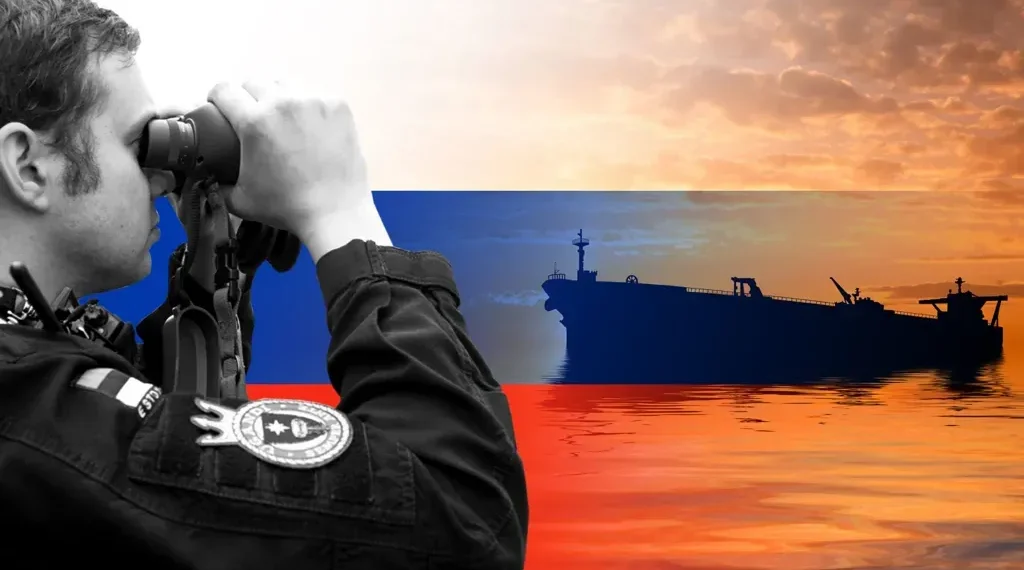Europe Confronts Growing Threat of Russia’s Shadow Oil Fleet
European authorities are tracking a growing network of Russian “shadow” oil tankers that bypass sanctions by sailing under false or suspended flags. These vessels raise environmental, security, and regulatory concerns while continuing to deliver oil to international markets, including China and India. Naval and coastguard agencies face limits in enforcing sanctions at sea, highlighting the complexity of maritime law.
Tracking the Shadow Fleet
In the western Baltic Sea, Swedish coastguard officers routinely challenge oil tankers suspected of violating sanctions. Using radio calls, officers ask crews to provide details about insurance, flag state, and last port of call. One tanker, Unity, recently reported departing from Suez, Egypt, with intentions reportedly to reach Russian ports.
Jonatan Tholin, a Swedish maritime investigator, explains that such vessels are part of the Kremlin’s “shadow fleet,” a collection of tankers used to evade Western oil price caps imposed after Russia’s invasion of Ukraine. Some of these ships are suspected of engaging in illegal activities, including undersea sabotage, illicit drone launches, and location data manipulation.
Legal and Regulatory Challenges
Maritime law grants countries limited authority to intervene in international waters. Many shadow ships operate without valid national flags, effectively becoming stateless and uninsured. Michelle Wiese Bockmann, senior maritime intelligence analyst at Windward AI, warns that accidents involving these vessels, such as large-scale oil spills, could leave regulators struggling to hold anyone accountable.
The International Maritime Organization reports that the number of falsely flagged ships has more than doubled this year, reaching over 450 globally, most of them tankers. Estonian Navy head Commodore Ivo Värk notes a sharp rise in such vessels near the Gulf of Finland, a gateway to Russia’s key oil terminals, Ust-Luga and Primorsk.
Unity – A Case Study
Unity offers a clear example of how the shadow fleet operates. Originally built in 2009 as Ocean Explorer, it sailed under Singapore’s flag for over a decade. In 2019, the vessel appeared in a UN report for transferring fuel to North Korea.
Between 2021 and 2024, the tanker changed names and flags multiple times—Ocean Vela, Beks Swan, March, and Unity—with registrations in the Marshall Islands, Panama, Russia, Gambia, and Lesotho. Despite these changes, it retains a single unique IMO number. Lesotho, a landlocked African nation, does not maintain an official shipping registry, meaning the vessel’s current flag is effectively invalid.
Unity’s movements illustrate the fleet’s evasive patterns. In the past year, it navigated through the English Channel four times, often between Russian ports and India, which has not signed the oil price cap. By early November, Unity was anchored outside Ust-Luga, despite being sanctioned by the UK and EU.
Enforcement Limitations
Naval officers caution that intervention at sea is constrained. The right of innocent passage allows ships to navigate international waters, though stateless vessels technically lack this protection. Countries such as France, Finland, and Estonia have detained shadow ships suspected of criminal activity, but these operations are rare due to potential escalation.
Commodore Värk recounts an incident in May when Estonia attempted to intercept a flagless tanker, prompting Russia to deploy a fighter jet. Since then, Russian naval vessels have maintained a continuous presence in the Gulf of Finland. NATO officials note that monitoring such vessels serves as a deterrent while avoiding direct confrontation.
Global Oil Market Impact
Shadow fleet tankers continue to generate substantial revenue for Russia. The International Energy Agency reports that Russian crude and oil product sales totaled $13.1 billion in October, down from $15.4 billion a year earlier. Analysis from the Centre for Research on Energy and Clean Air indicates that shadow tankers account for 62% of shipped Russian crude oil, with China, India, Turkey, and the EU as major buyers.
Opaque ownership and frequent name or flag changes complicate tracking. Windward AI estimates that the beneficial owners of 60% of these vessels remain unknown, highlighting the difficulty of enforcing sanctions in maritime trade.
Security and Environmental Concerns
Experts warn that the shadow fleet poses both environmental and security risks. Ships with poor maintenance may cause spills or accidents. The combination of stateless operations, sanctions evasion, and proximity to sensitive infrastructure increases the potential for incidents.
Bockmann describes the situation as a visible erosion of international maritime rules. “The dark fleet is getting darker,” she says, emphasizing the stakes for both environmental protection and global security.
Russia’s Response
Russia’s embassy in London dismissed the term “shadow fleet” as misleading and discriminatory. A spokesperson argued that Western sanctions are “illegitimate” and disrupt established commercial practices. They added that invalid flags are often due to administrative delays and that restrictive regulations force shipowners to navigate a fragmented legal landscape.
Outlook
Europe continues to monitor and document the shadow fleet, balancing enforcement with the risk of confrontation. Naval and coastguard authorities emphasize that surveillance and reporting can serve as a deterrent, even when direct intervention is limited. Analysts warn that without international cooperation, shadow fleet activity may continue to challenge sanctions, maritime law, and global energy security.
This article was rewritten by JournosNews.com based on verified reporting from trusted sources. The content has been independently reviewed, fact-checked, and edited for accuracy, neutrality, tone, and global readability in accordance with Google News and AdSense standards.
All opinions, quotes, or statements from contributors, experts, or sourced organizations do not necessarily reflect the views of JournosNews.com. JournosNews.com maintains full editorial independence from any external funders, sponsors, or organizations.
Stay informed with JournosNews.com — your trusted source for verified global reporting and in-depth analysis. Follow us on Google News, BlueSky, and X for real-time updates.














